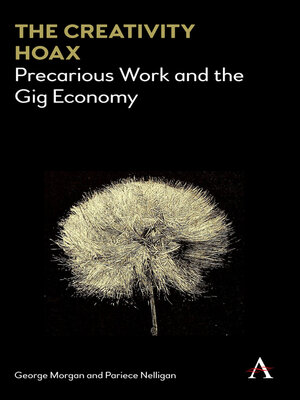
Sign up to save your library
With an OverDrive account, you can save your favorite libraries for at-a-glance information about availability. Find out more about OverDrive accounts.
Find this title in Libby, the library reading app by OverDrive.



Search for a digital library with this title
Title found at these libraries:
| Library Name | Distance |
|---|---|
| Loading... |
Politicians, educators and business leaders often tell young people they will need to develop their creative skills to be ready for the new economy. Vast numbers of school leavers enrol in courses in media, communications, creative and performing arts, yet few will ever achieve the creative careers they aspire to. The big cities are filled with performers, designers, producers and writers who cannot make a living from their art/craft. They are told their creative skills are transferable but there is little available work outside retail, service and hospitality jobs. Actors can use their skills selling phone plans, insurance or advertising space from call centres, but usually do so reluctantly. Most people in the 'creative industries' work as low-paid employees or freelancers, or as unpaid interns. They put up with exploitation so that they can do what they love. The Creativity Hoax argues that in this individualistic and competitive environment, creative aspirants from poor and minority backgrounds are most vulnerable and precarious. Although governments in the West stress the importance of culture and knowledge in economic renewal, few invest in the support and infrastructure that would allow creative aspirants to make best use of their skills.
|We often hear that creative and intellectual innovation is the key to western economic renewal, that cognitive capitalism has succeeded in globalizing the mental-manual division of labour, and that old work – blue-collar, repetitive, de-skilled – is now consigned to the factories of the developing world. At the other end of the long production chains, the West relies increasingly on immaterial labour. From this perspective no rustbelt city can hope to regenerate, no developing nation can ascend to first-world status, without the 'new oil' of intellectual property. Workers in general are told to adapt to this transition, to remake themselves for the new economy. Rapid shifts in patterns of consumption, taste and technology can render jobs and skills obsolete in ways that defy the planning and foreclosures of Fordism.
Vocational fortunes depend not only on intellect and creativity but also on entrepreneurial acumen and vocational agility. New capitalism seeks to make a virtue of transience. It has taken up the counter-culture's critique of the Fordist job-for-life, in order to persuade young people in particular that working life is (and should be) episodic and project-based. The precariat (Standing 2009) must embrace the idea of the improvised post-modern career - a wild vocational ride that unfolds like the levels of a video game. They must become labile labour: opportunistic, excitable, flexible, mobile and ready to flow without protest or friction into the spaces opened up by Post-Fordism. Those who resist or ignore this turbulence and cling to the goal of security are in effect sleepwalking towards redundancy.
'The Creativity Hoax' argues that creativity, the leitmotif of new capitalism, has become a key neo-liberal idiom for reorganizing work and working life in ways that erode communal bonds, loyalties and values and blur the boundaries between work and play, public and private. However, the creative economy remains a largely unrealized project, a fantasy of regeneration. Despite the inflated rhetoric of vocational fulfilment, much work performed in the West remains low-skilled and low-paid. Very few make a living exclusively from creative labour whether as employees, freelancers, or entrepreneurs. For the most part it is transnational cultural corporations that reap the patentable or copyrightable bounty, belying the egalitarian myths of the new economy. [NP] The challenge for capital has been...







